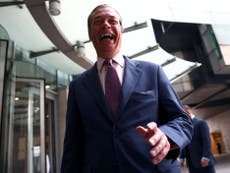In Germany, the Greens are now a mainstream political force – and they will shape Europe's future
The passion of old green radicalism and the pragmatism of contemporary, inclusive German politics could help Europe find a way to face the problem of climate change

At this stage, it’s first and foremost a German phenomenon, though there’s clear evidence of it elsewhere. Might it herald a future rallying point for Green parties across Europe, perhaps even for the depleted, dislocating centre-left?
The German Greens are celebrating an historic breakthrough in the European elections, doubling their vote to almost 21 per cent to finish second behind Chancellor Angela Merkel’s CDU-CSU (28.9 per cent). Among voters under the age of 30, one in three voted Green.
The Greens beating into third place the social democratic SPD party for the first time in national elections (15.8 per cent), is tantamount to an earthquake in German politics, akin to the extremist Alternative for Deutschland’s entering the federal parliament after elections in 2017. The Greens won about 1.3 million votes from the SPD on Sunday, but almost as many – 1.1 million – at the expense of the centre-right CDU-CSU, following the pattern of Bavarian regional elections last October.
So why does the German model of environment politics appear to be working when Green parties elsewhere, though on the rise, polled substantially less than their German brethren? Significantly, the Greens have drawn voters away from other parties by arguing a pragmatic, pro-alliance approach to dealing with them. Co-leader Robert Habeck has said the consensus-minded Grünen are prepared to break bread with any party, save the extremists.
The broad church approach appears to extend beyond both national politics and borders. In Europe, the gargantuan cost of greening the economy can’t be paid for by governments still heavily in debt after the 2008 financial crisis. The private sector is needed. So the fight to save the planet must be waged with it and not against.
In the developing world, the old left’s de-globalising argument doesn’t really wash — urging depopulation and curbs on growth — when more open economies have helped to make poorer countries richer in the first place. The perspective here is that an ideological view of the environment puts a brake on the emergence of workable, electorally sellable strategies. “The Greens represent the people who believe in the necessity of the sustainable transformation of the economy and the financial system,” said Greens lead candidate in Bavaria, Henrike Hahn, who pre-politics was a business consultant.
So is this all this merely cyclical? The Greens have risen before in Germany, as Green parties do when mainstream parties, particularly of the left, are on the wane. Yet today the German Greens are most effectively riding the wave of public urgency about the environment, marked by protest (inspired by Swedish teenager Greta Thunberg; joined in recent days by audacious German vloggers such as the the blue-haired “Rezo“).
However, we’ve now reached a point of inevitability: without major coordinated action, at the local, regional and international level, life on earth may be heading for the wall. This month a UN report detailed the tragic decline of biodiversity and claimed that a million species of plants and animals could face extinction within decades. We know already that the world’s non-arable regions are growing, entrenching water shortages; that global temperatures are on course to rise between 3 and 5 degrees by the end of the century (compared to 1850); that deforestation is severely compromising the planet’s absorption of carbon dioxide; that marine plastic pollution has increased ten-fold since 1980. Another joint scientific report last week said that seas levels could rise by a breathtaking two metres by the end of the century.
From the traditional Green corner comes the fundamentalist argument that if the market economy were going to save the environment, we would know by now because we’re living in it. Yet internal divisions are ripping the more traditional Green approach asunder. In France, the so-called “social-ecological left” is a seriously fractious five-way multiple. Encouraging is that the more progressive Europe écologie les Verts (EELV) won about 13.5 per cent of the vote.
The way forward, perhaps, is to join the passion of old green radicalism to the more contemporary, inclusive German approach. To seek what French political scientist Antoine Colombani has called “virtuous interactions” between market forces and government policies for transformative change.
France’s Yellow Vest protests, sparked by an ill-considered diesel tax, made clear that even small-time environment policy is asking for trouble when imposed or exacerbating inequalities, or seen to be hurting the non-urban and regional poor. The fact is that the emergency of the environment is upon us and the public is substantially aware. The question now is whether the green body politic, in its various forms, has the nous and sense of solidarity to seize the mantle, to give public concern effective, broad-based political expression.
The EU elections reaffirmed the German Greens as the standard-bearers in environmental party politics. It will be fascinating to see how they now fare. Whether they have the power, the ambition and the realism to draw others to them, against the lobbies, the force of the status quo, and with the organising ethno-nationalists breathing down their necks.



Join our commenting forum
Join thought-provoking conversations, follow other Independent readers and see their replies